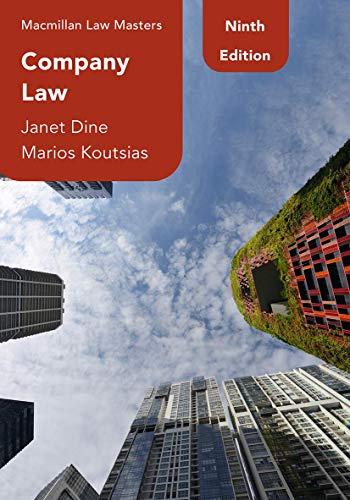Question
1. Joe Brown gave $350,000 to his wife, Mary, with which to buy real property. They orally agreed that title to the real property should
1. Joe Brown gave $350,000 to his wife, Mary, with which to buy real property. They orally agreed that title to the real property should be taken in the name of Mary Brown but that she should hold the property in trust for Joe Brown. There were two witnesses to the oral agreement, both of whom are still living. Mary purchased the property on September 2, and a deed to it with Mary Brown as the grantee was delivered.
Mary died ten years later, without a will. The real property is now worth $1,000,000. Joe Brown is claiming the property as the beneficiary of a trust. Mary's children are claiming that the property belongs to Mary's estate and have pleaded the statute of limitations and the statute of frauds as defenses to Joe's claim. There is no evidence to prove whether Mary would or would not have conveyed the property to Joe during her lifetime if she had been requested to do so. What are Joe's ownership rights to this particular real property? Please explain.
2. Arnold executed a one-page will in which he devised his farm to Burton. Later, after a quarrel with Burton, Arnold wrote the words "I hereby cancel and revoke this will /s/Arnold" in the margin of the will but did not destroy the will. Arnold then executed a deed to the farm, naming Connie as grantee, and placed the deed and will in his safe. Shortly afterward, Arnold married Donna, with whom he had one child, Ernest. Arnold died some time later, and the deed and will were found in his safe. Burton, Connie, and Ernest claim the farm, and Donna claims dower. Discuss the validity of each claim. Please explain.
3. John Hobelsberger lived alone on his farm near Kranzburg, South Dakota. A grandniece, Phyllis Raml, and her husband, Ralph, lived on and operated a farm about two miles away. Hobelsberger and the Ramls had a friendly and cordial relationship. The Ramls visited him rather frequently and largely cared for him during his later years. Hobelsberger was hospitalized on October 23, and his condition was diagnosed as intermittent cerebral insufficiency. During his hospitalization, he requested that the Ramls send an attorney to see him about the preparation of a will. Thomas Green, an attorney, interviewed the testator on or about November 10 and prepared a will in compliance with his instructions.
Hobelsberger was transferred to a nursing home on November 19. On November 22, Green and a secretary went to the nursing home and witnessed his signing of the will. Hobelsberger was then eighty years old. He subscribed the will with a mark because he was having trouble with his hands. Hobelsberger died on July 19, of the following year, survived by twenty-seven nieces and nephews and seven grandnieces and grandnephews. The will, after providing for the payment of debts and funeral expenses, left Hobelsberger's entire estate to Phyllis Raml. Nine of the nieces and nephews contested the will, claiming lack of testamentary capacity, undue influence by the Ramls, and improper execution. The county court admitted the will to probate, the circuit court affirmed, and the contestants appealed. Decision? Please explain.
Step by Step Solution
There are 3 Steps involved in it
Step: 1

Get Instant Access to Expert-Tailored Solutions
See step-by-step solutions with expert insights and AI powered tools for academic success
Step: 2

Step: 3

Ace Your Homework with AI
Get the answers you need in no time with our AI-driven, step-by-step assistance
Get Started


